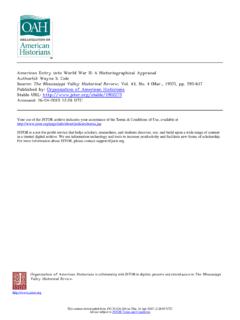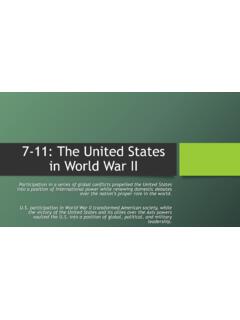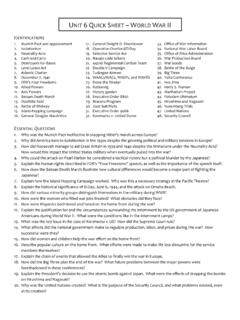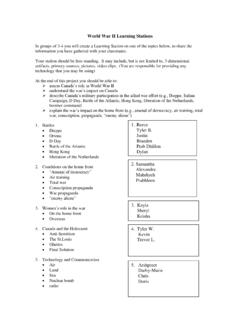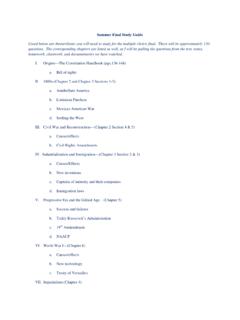Transcription of The Deepening of the European Crisis: World War II
1 Chapter 27. The Deepening of the European Crisis: World War II. Adolf Hitler salutes soldiers marching in Nuremberg during the party rally in 1938. p832. Prelude to War (1933-1939). The Role of Hitler The doctrine of Lebensraum The proper conditions and strategies of expansion The Diplomatic Revolution (1933-1936). German rearmament, 1935. Repudiation of disarmament clauses of Treaty of Versailles Occupation of the Rhineland, 1936. New Alliances Rome-Berlin Axis, October 1936. Anti-Comintern Pact between Germany and Japan, November 1936. Prelude to War The Path to War (1937-1939). Ongoing rearmament Preparations for blitzkrieg ( lightning war ). Union with Austria, 1938. Czechoslovakia Demands for the Sudetenland, September 1938. Appeasement: the Munich Conference, September 29, 1938. Neville Chamberlain (1869 1940). German dismemberment of Czechoslovakia Poland Nonaggression pact with the Soviet Union, August 1939.
2 Hitler's demands and invasion provoke resistance and war, September 1939. Hitler Arrives in Vienna p836. MAP Changes in Central Europe, 1936 1939. Map p837. Hitler Declares War p839. The Path to War in Asia Rise of the Japan Imperial strength and weakness Acquisition of Korea, Formosa, Manchuria, and the Marshall, Caroline, and Mariana islands Internal tensions, economic crises, and right-wing patriotism Japanese goals in East Asia Military strategy targeting China Japanese seizure of Manchuria, 1931. Chiang Kai-shek (1887 1975). Seizure of Nanjing, 1937. Cooperation with Nazi Germany A Japanese Victory March in China p840. CHRONOLOGY Prelude to War, 1933 1939. p840. The Course of World War II. Victory and Stalemate Dismemberment of Poland within four weeks Hitler's attack in the west Phony War , winter 1939-1940. Germany resumes offensive Attacks on Denmark, Norway, Netherlands, Belgium, and France, April-May 1940.
3 Evacuation of Dunkirk Surrender of France, June 22, 1940. Establishment of the Vichy regime Marshal Henri P tain (1856 1951). MAP World War II in Europe and North Africa Map p842. The Course of World War II. The Problem of Britain New leadership: Winston Churchill (1874 . 1965). Battle of Britain, August-September 1940. Failure of the German Luftwaffe to weaken Britain for invasion Possibility of a Mediterranean strategy Invasion of the Soviet Union Attack launched, June 22, 1941. Soviet resistance and counterattacks stalls the German offensive, December 1941. German Troops in the Soviet Union p843. German Troops in the Soviet Union p843. The War in Asia The End of American Isolationism Japan's assault on Pearl Harbor and the Philippines creates global war Japanese advances, spring 1942. Establishment of the Great East Asia Co-Prosperity Sphere Attacks galvanized American opinion in support for war MAP World War II in Asia and the Pacific Map p844.
4 Turning Point of War, 1942-1943. The Grand Alliance versus the Axis Powers Defeat of Germany the first priority Military aid to Russia and Britain Allies ignore political differences Agree on unconditional surrender Allied victory in Africa, 1943. Battle of Stalingrad Devastation and deprivation, winter 1942-1943. German surrender, February 1943. Battle of Midway, June 4, 1942. Turning the tide in Asia American advances across the Pacific The Battle of Stalingrad p845. The Battle of Stalingrad p845. The Last Years of the War Allied Advances in the West Invasion of Italy, September 1943. Fall of Rome, June 4, 1944. D-Day invasion of France, June 6, 1944. Five assault divisions land on Normandy beaches Advance into Germany Soviet Offensive in the East Battle of Kursk, July 5-12, 1943. Advances in eastern Europe, 1944-1945. Hitler's suicide and German surrender Defeat of Japan Surrender after atomic bombs on Nagaski and Hiroshima, August 1945.
5 Crossing the Rhine p847. CHRONOLOGY World War II. p848. The Nazi New Order The Nazi Empire Organization Some areas made into German provinces Most occupied and administered by Germans Racial considerations for the Nazi New Order Plans for an Aryan racial empire Brutality of the plans for the East Evacuation of inferior peoples, colonization by ethnic Germans Economic exploitation Use of foreign workers Forced labor to address German labor shortages Cause of resistance of Nazi occupation forces Salomon Perel/Josef Peters (Marco Hofschneider) as a Hitler Youth member p851. Resistance Movements Nazi-Occupied Europe Sabotage, espionage, and anti-Nazi sentiments at home, governments-in-exile abroad Charles de Gaulle's Free French movement Josip Broz and guerilla warfare in Yugoslavia Communist leadership Women's roles Germany The White Rose movement Repression by the Gestapo Colonel Count Claus von Stauffenberg's failed assassination attempt, July 1944.
6 The Holocaust Early Nazi Policy First focused on emigration The SS and the Einsatzgruppen The Final Solution: annihilation of the Jewish people Leadership under Reinhard Heydrich (1904 . 1942). From concentration in ghettos to death squads; 1. million Jews dead The Holocaust Death camps Plans for systematic extermination (in operation by spring 1942). Jews to be shipped to camps in Poland, executed by Zyklon B gas, and burned in crematoria Largest center at Auschwitz-Birkenau Resulted in death of nearly 2 out of 3 European Jews (5 to 6 million). The Other Holocaust Death of at least another 9 to 10 million people Targeting European Gypsies, subhuman Slavic peoples, and homosexuals Death through slave labor The Holocaust: Activities of the Einsatzgruppen p852. MAP The Holocaust Map p853. The Holocaust: The Extermination Camp at Auschwitz p854.
7 The New Order in Asia Great East Asia Co-Prosperity Sphere Asia for the Asians . Exploitation of resources Subjection of people to severe hardships Japanese Occupation Korean comfort women . 800,000 Korean forced laborers Constructed Burma-Thailand railway The Home Front Mobilization of Peoples Great Britain 55 percent of the people were in war work . By 1944, women held 50 percent of the civil service positions Dig for Victory campaign Emphasis on a planned economy Acceptance of increased government interference The Soviet Union Enormous losses and sacrifice of Soviet people Emergency mobilization Soviet women Combatants and laborers Women in the Factories p856. Women in the Factories p856. The Mobilization of Peoples The United States Impact of mobilization Economic and social gains and problems Civil rights issues and tensions: African-Americans and Japanese Americans Germany Problematic economic policies Continued production of consumer goods Plunder from conquered countries Albert Speer and rising armaments production Total mobilization not authorized until 1944.
8 Japan Highly mobilized society Values: bushido and kamikaze Civilians on the Front Line: The Bombing of Cities Luftwaffe Attacks The Blitz in Britain The Bombing of Germany Allied bombing raids on German cities Targeted American daytime bombing Devastation of Hamburg and Dresden Success and failure of bombing raids The Bombing of Japan: the Atomic Bomb Hiroshima, August 6, 1945. Nagasaki, August 9, 1945. The Impact of Total War p860. The Impact of Total War p860. The Impact of Total War p860. Aftermath of the War The Costs of World War II. Loss of human life: 21 million soldiers and 40. million civilians dead Displacement of 30 million people Physical devastation Monetary cost of $4 trillion The Allied War Conferences The Conference at Tehran, November 1943. Future course of the war, invasion of the continent for 1944. Agreement for the partition of postwar Germany The Victorious Allied Leaders at Yalta p862.
9 Aftermath of the War The Allied War Conferences The Yalta Conference, February 1945. Approval of the Declaration on Liberated Europe . American concerns Soviet military assistance for the war against Japan Creation of a United Nations Agreement on German unconditional surrender Free elections in Eastern Europe Intensifying differences Deteriorating relations with the Soviets The Potsdam Conference, July 1945. Growing problems among the Allies Emergence of the Cold War MAP Territorial Changes After World War II. Map p863. Chapter Timeline p865. Discussion Questions What steps did Hitler take to conquer Britain? Why did Hitler abandon the fight for Britain and turn toward Russia? What seemed to have been the causes of Soviet suspicions about Britain and the US throughout the war? Give examples. How were conquered or occupied peoples treated by the Germans during the war?
10 Give examples. How did each country mobilize the home front for the war effort? How and why did the peace settlement give way to the tensions that initiated the Cold War?

